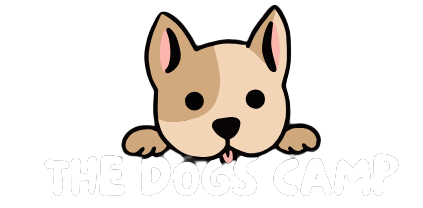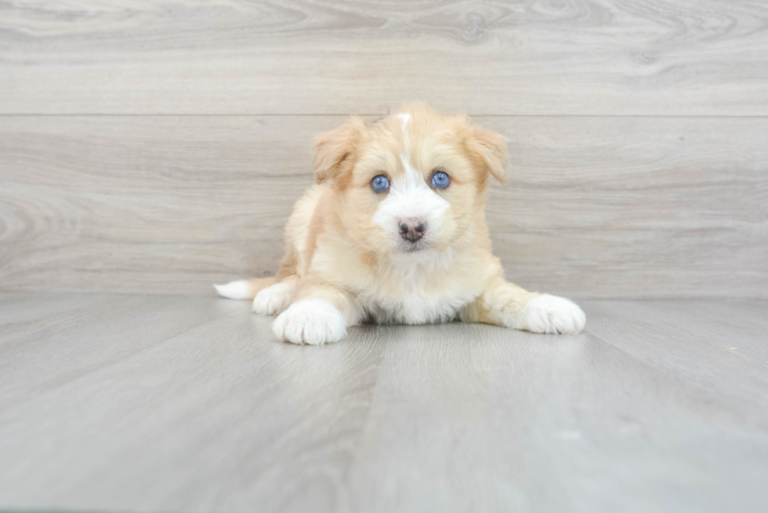Husky Poodle Mix: Mini Huskydoodle Dog Breed
The Huskydoodle is a unique mix, born from the crossing of a Siberian Husky with a Poodle. This breed is becoming a favorite among dog lovers thanks to its diverse coat colors that often mirror the striking patterns of the Siberian Husky. Huskydoodles may have a coat that ranges from minimal shedding to losing hair with the seasons, a trait designed to blend the endurance of Huskies and the Poodle’s allergy-friendly coat.
These intelligent and lively dogs need plenty of exercise and mental challenges to stay happy. They’re known for their friendly nature and love for human companionship. However, they might get into trouble if bored or left alone too often.
Regarding family life, Huskydoodles are great with kids and welcoming to new faces, but they might chase smaller animals due to their hunting instincts. To ensure they’re healthy and well-behaved, it’s essential to provide consistent training, regular health check-ups, and a balanced diet.
Key Takeaways
- Huskydoodles are a Siberian Husky and Poodle blend.
- Their coats can vary from low shedding to seasonal shedding.
- These dogs thrive on exercise and companionship.
Huskydoodles mix the endurance of Huskies with Poodles’ hypoallergenic coats. They are energetic and require mental stimulation to avoid mischief. Proper training, health care, and diet are vital for their well-being.
Quick Facts
The Huskydoodle is a hybrid dog breed that blends a Poodle’s smarts and low-allergy coat with the endurance and power of a Siberian Husky. These dogs vary in appearance, but they’re usually energetic and robust.
A Huskydoodle can weigh anywhere from 40 to 60 pounds and stand about 20 to 25 inches tall. Their coat might be medium length and either have the Poodle’s characteristic low-shedding quality or the Husky’s tendency to shed seasonally.
To keep a Huskydoodle happy and out of trouble, owners should provide plenty of exercise and activities that challenge them physically and mentally.Huskydoodle Pictures
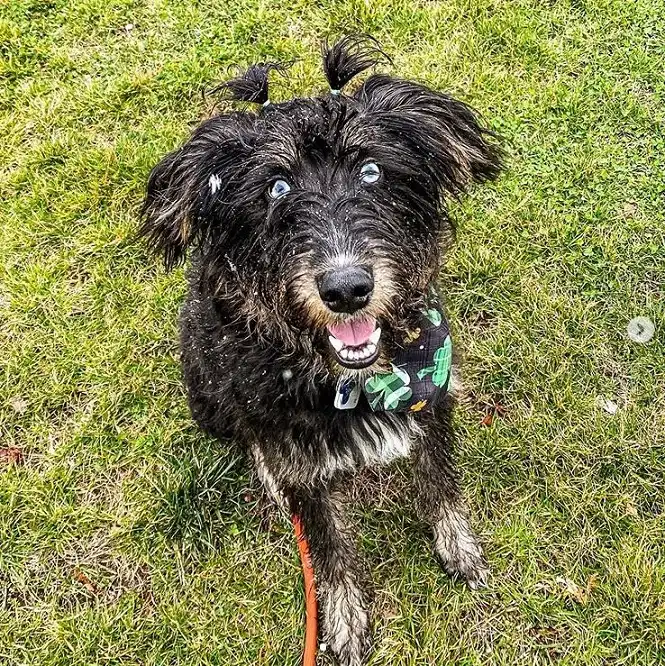
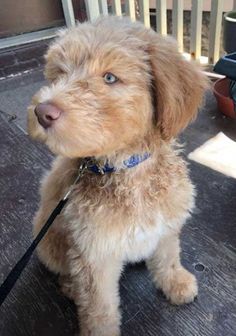
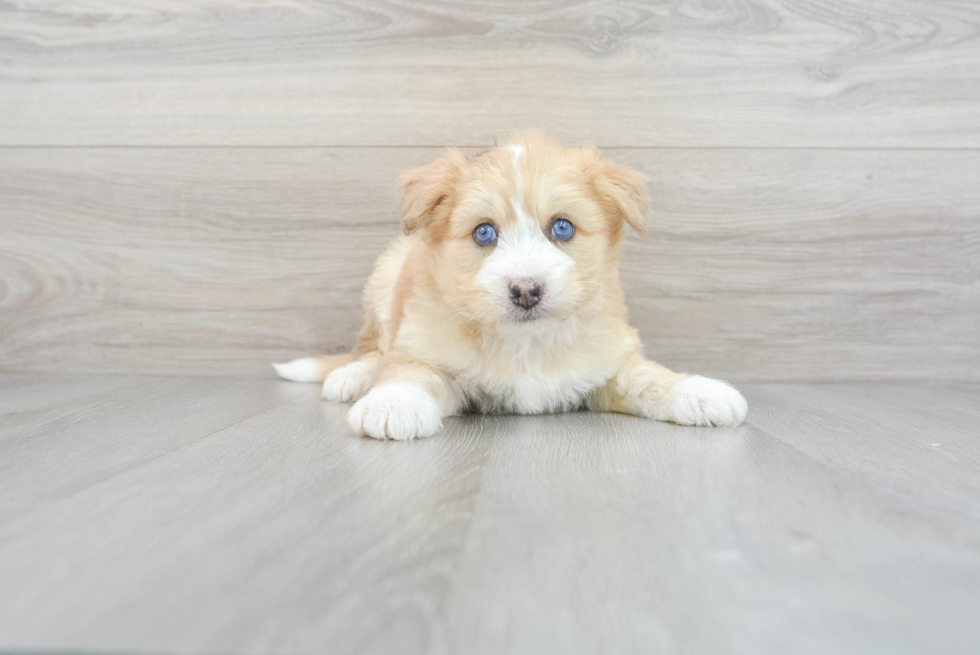
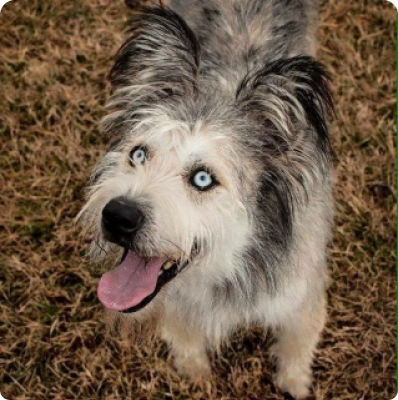
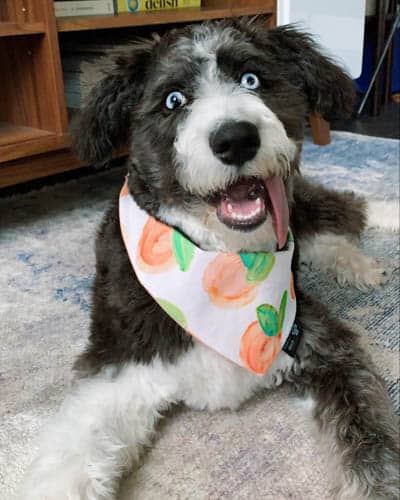
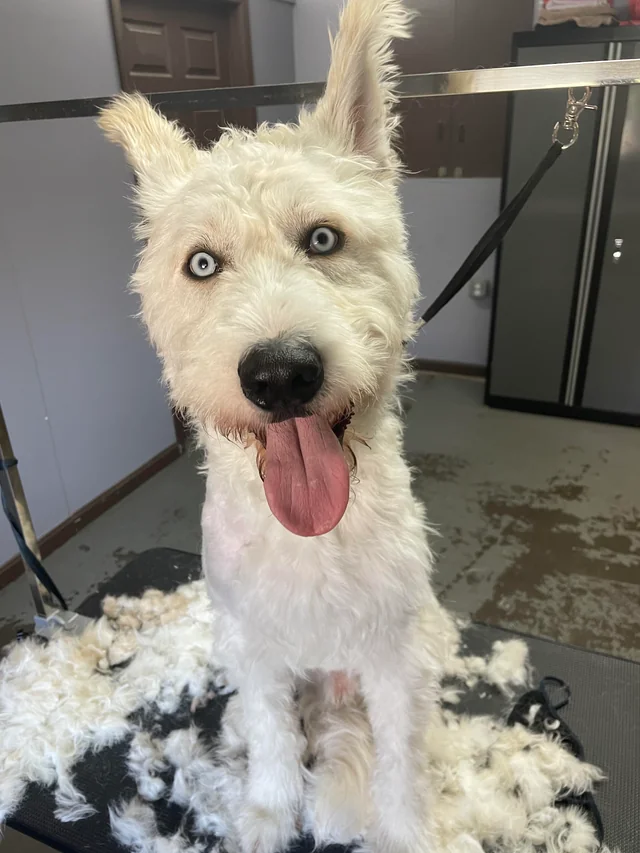
Overview
A Huskydoodle is a unique mix, inheriting the Poodle’s allergen-friendly coat and brains with the Siberian Husky’s endless energy and endurance. It’s a purposeful crossbreed, bringing together the best of the Husky and the Poodle to produce a pet that blends their looks and personalities.
You can expect a Huskydoodle to be of medium build, with its size reflecting its diverse background. Due to the Husky’s pack nature, Huskydoodles are friendly but selective, which can affect how they get along with other animals.
Combining the Poodle’s minimal shedding with the Husky’s notable shedding patterns makes it hard to predict how much grooming the Huskydoodle will need.
Key Traits of Huskydoodles Puppy
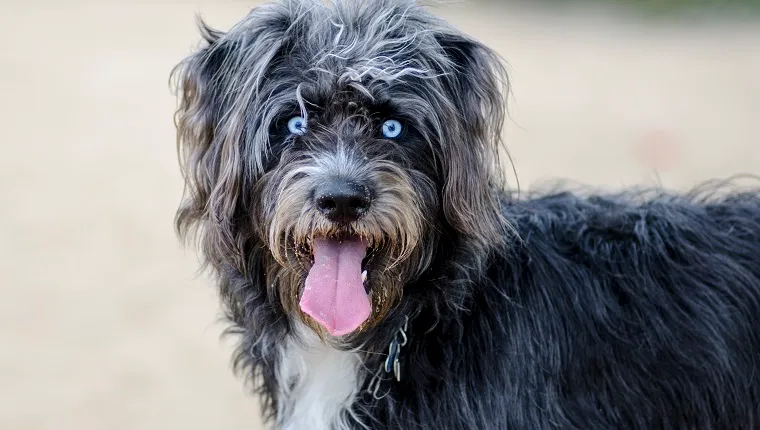
Huskydoodles are a unique blend of Poodle smarts and the Siberian Husky’s robust energy, bringing together the best of both breeds. They’re known for their sharp intelligence, often quickly picking up new commands, which means they need plenty of mental stimulation and physical exercise to stay happy.
Their coats are a mix of the Poodle’s low-shedding fur and the Husky’s thicker coat, so regular grooming is necessary to prevent tangles and keep their fur in good condition.
These dogs have a lot of energy and require regular exercise to channel their vigor positively, helping to avoid any unwanted chewing or digging that can happen when they get bored. Huskydoodles are generally very social and get along well with children. Still, because they might have a strong prey drive, it’s best to introduce them early to various people and animals.
They are also known for their deep loyalty to their families, but they can become anxious if left alone for too long, making them ideal for homes where someone is usually around.
Breed Origin Story of Husky Poodle
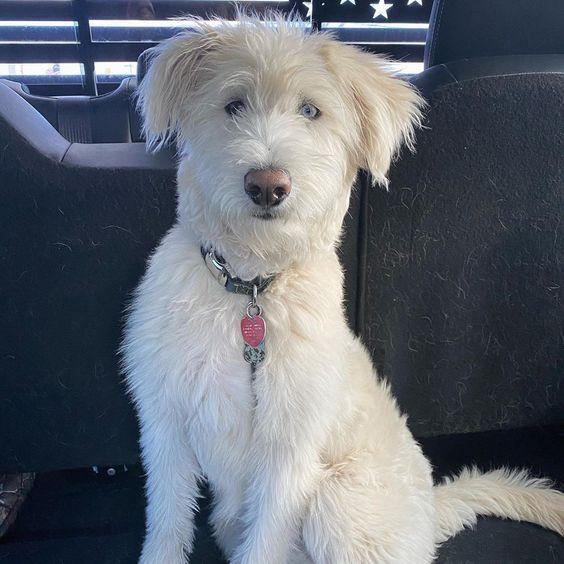
The Huskydoodle is a designer dog breed combining the Siberian Husky and the Poodle. Breeders aimed to blend the Siberian Husky’s toughness and stamina with the Poodle’s allergy-friendly coat.
The crossbreeding started around the 1990s, laying the groundwork for this mixed breed. The goal was to craft a dog that would bring together the Husky’s energy and dedication with the low-shedding coat of the Poodle, making them a good fit for today’s pet owners.
Ancestral Breed Combination
The Huskydoodle was developed in North America during the late 1990s through careful crossbreeding. Breeders aimed to combine the Siberian Husky’s stamina and work ethic with the Poodle’s minimal shedding coat.
The goal was to create a dog with the Husky’s durability suited for hard work and the Poodle’s coat, which is less likely to trigger allergies. The early batches of Huskydoodlesaimedt blend these qualities, offering a dog that might provide allergy sufferers a capable and energetic companion.
Historical Development Timeline
In the late 1990s, North American breeders began crossbreeding Siberian Huskies with Poodles, creating the mini Huskydoodle.
They aimed to combine the endurance and strength of the Siberian Huskies, famous for pulling sleds across icy landscapes, with Poodles’ non-shedding coats and sharp wits.
The goal was to create a dog with the best qualities of both breeds: the Husky’s physical resilience and the Poodle’s intelligence and allergy-friendly coat.
This new breed was envisioned as a dynamic pet, adaptable to various homes.
Purpose Behind Mixing
Breeders aimed to combine the Siberian Husky’s energy with the Poodle’s non-shedding coat to create the Huskydoodle, a dog perfect for those with allergies who still want a lively pet.
The crossbreeding was careful, aiming to blend the best of both worlds: the Poodle’s smarts and minimal shedding with the Husky’s stamina and enthusiasm for life.
The goal was a medium-sized, clever, loving dog that fits well with active families.
Weight and Height Range
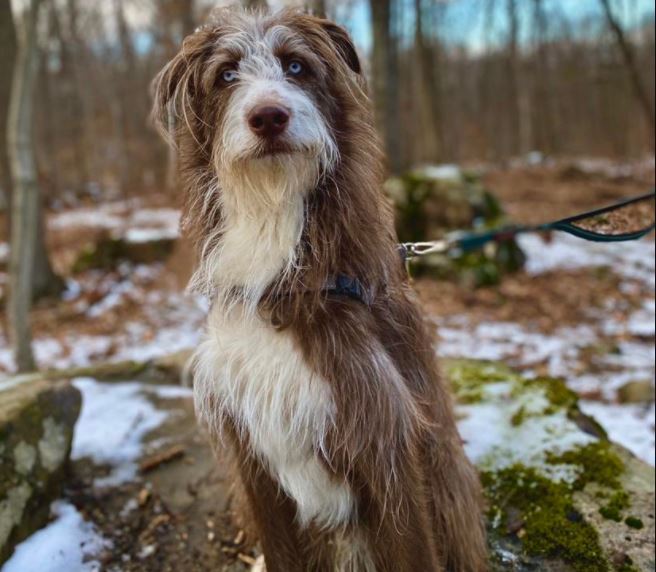
If you consider adding a Huskydoodle to your family, you’ll want to understand their size and growth potential. On average, a full-grown Huskydoodle weighs between 40 and 60 pounds and has a height of 12 to 25 inches at the shoulder. The growth rate of these dogs can vary widely, depending on their genetics, the size of the Poodle parent, and their diet.
Although there isn’t a universal standard for Huskydoodles, enthusiasts often refer to common measurements to promote uniformity within the breed.
Knowing these size details helps future owners gauge how much space and exercise their Huskydoodle will need. It also hints at possible health concerns that are more common in dogs of this size. Knowing these aspects, you can better prepare your home and routine to suit your new pet.
Average Adult Size
Huskydoodles are a crossbreed that often weigh between 40 and 60 pounds and have a height of 12 to 25 inches at the shoulder. They are considered a medium to large dog breed, and their Poodle parent’s size largely influences their size.
The combination of genes from the Siberian Husky and the Poodle means their weight and height can vary significantly. A Huskydoodle may inherit the shorter stature of a miniature Poodle or the taller frame of a standard Poodle, which contributes to the breed’s varied physical appearance.
This wide range of sizes makes Huskydoodles a versatile fit for many homes and lifestyles.
Growth Rate Variability
In the initial months up to about a year and a half, Huskydoodle puppies grow steadily. Their final size as adults largely depends on how big the Poodle parent was. These pups can vary greatly, from the smaller Mini Huskydoodles to the larger Standard Huskydoodles. Monitoring their growth is vital to ensure they hit suitable developmental markers for their health.
Owners need to tailor their care approach to each Huskydoodle’s unique needs. This includes regular grooming and enough physical activity to maintain good health. Since growth rates can vary, you must meet the changing dietary and exercise needs as your Huskydoodle grows.
Breed Standard Measurements
Huskydoodles are a mixed breed with a notable size-range due to their Siberian Husky and Poodle heritage. They can weigh anywhere between 40 to 60 pounds and stand 12 to 25 inches tall at the shoulder. This size variation is influenced by their genetics and the traits they inherit from their parents. The coat type, for instance, can make a Huskydoodle appear larger than it is. While these figures give a general idea of what to expect, it’s common to see Huskydoodles that don’t fit these measurements.
Owners interested in this breed should be aware that the active nature of the Huskydoodle requires sufficient space. The size suits their lively personality and affects their health and lifespan. When picking a Huskydoodle, looking at the dog’s family history can give you a better prediction of its adult size. However, remember that each dog is unique, and variations are part of what makes the Huskydoodle such an interesting breed.
Miniature Vs. Standard
Miniature Huskydoodles are small and light, usually weighing between 15 and 35 pounds and measuring 12 to 20 inches tall. On the other hand, Standard Huskydoodles are more considerable, weighing 35 to 60 pounds with a height of 20 to 25 inches. These size differences mean a lot for someone looking to adopt a dog.
If you enjoy active lifestyles and have plenty of space, a Standard Huskydoodle might be your ideal companion due to its larger size and love for exercise. Given its smaller size, a Miniature Huskydoodle could be more practical for those living in apartments or smaller homes.
Both sizes need their coats groomed regularly, so keep that in mind when choosing the right dog for your home and daily routine.
Impact on Health
Monitoring the weight and height of Huskydoodles is vital for their health. These dogs typically weigh between 40 to 60 pounds and stand 12 to 25 inches tall at the shoulder.
We are keeping them within this range through regular exercise, vital in preventing joint issues such as hip and elbow dysplasia, common in parent breeds. Regular activity keeps their joints healthy, helps prevent their coats from tangling, and supports heart health.
It’s also essential to stay on top of their health with consistent vet visits to catch any early signs of potential problems. Careful attention to the needs of Huskydoodles can contribute to their longevity and quality of life.
Temperament Traits
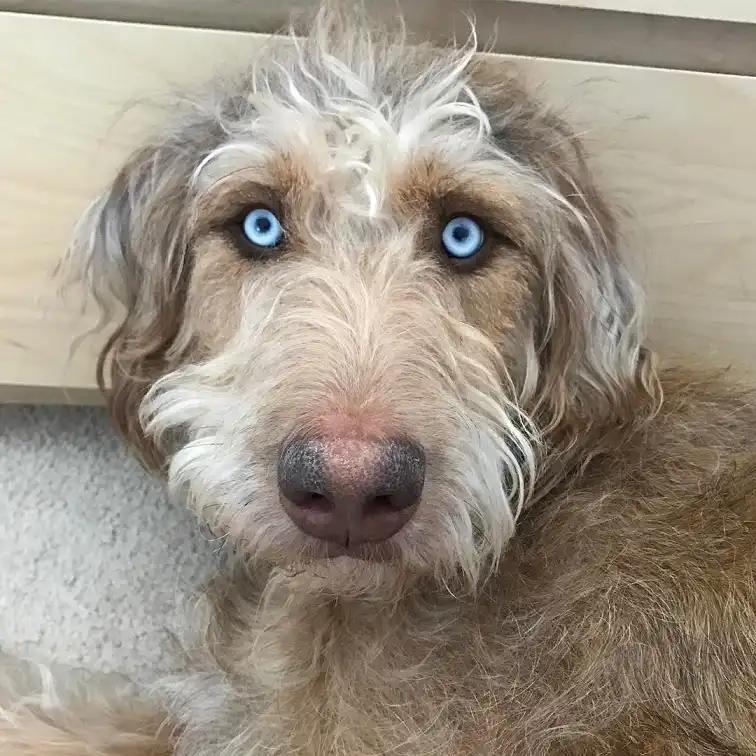
When looking at the temperament of Huskydoodles, they stand out for their affectionate nature towards family members. However, their interactions with kids and other animals should be watched to ensure they remain gentle and consistent.
These dogs have a high energy level and need daily exercise to prevent any unruly behavior that might come from not being active enough.
Huskydoodles are intelligent and usually train quickly, but their training needs to start early and be consistent to be effective.
Family-Friendly Nature
Huskydoodles are known for their friendly demeanor, making them great pets for homes with kids and other pets. They handle the playful roughness of kids well, fitting perfectly into active households.
These dogs are intelligent, which means they learn quickly and respond well to training, ensuring they become well-behaved family members. Their keenness to please makes them lovable pets, and their sensitivity to people’s emotions allows them to provide comfort and support to their families.
Energy Level Considerations
Huskydoodles are high-energy dogs that need plenty of exercise to stay happy and healthy. They should be active for at least an hour each day, but more active dogs might need over two hours to tire them out.
To keep these intelligent dogs from getting bored and possibly destructive, their owners should provide activities challenging their minds and bodies. Obedience training mixed with fun games works well to keep them engaged.
Consistent exercise helps prevent behavior problems and keeps them in good health, reducing the risk of issues they might be prone to because of their breed.
Training Responsiveness
Huskydoodles, known for their smartness and desire to please, are often good at learning when the proper methods are used. Positive reinforcement and routine are crucial to their learning success.
When training your Huskypoo, it’s vital to have regular sessions that both challenge and engage their minds. Although they learn quickly, these dogs need firm and consistent guidance to manage their natural impulses, like their strong chase instinct.
Applying steady rules helps shape a well-behaved and attentive pet, making the most of the Huskydoodle’s natural intelligence and friendly nature.
Prey Drive Management
Huskydoodles are known for their strong prey drive due to their ancestry. These energetic dogs come from a lineage of Siberian Huskies, bred for hunting and endurance in harsh climates.
Consistent and structured training from a young age is critical to maintaining their chasing instincts in check. It is vital to teach them to obey commands and control their impulses, especially if they live with other pets.
Always watch them around smaller animals and use positive reinforcement to affirm good behavior. Regular exercise and mind-challenging activities also effectively channel their energy into more desirable actions, helping curb any tendencies to chase.
Behavioral Quirks
Huskydoodles are known for their bright minds and lively spirit, which often lead to some amusing behaviors. To keep their natural prey drive in check, they require consistent training. These intelligent dogs don’t shed excessively but need plenty of physical activity and mental stimulation to stay happy. Without enough exercise, they might start chewing or damaging things out of boredom.
If Huskydoodles are left alone too often, they may develop anxiety, resulting in damaged furniture or other items in the home. Despite their high energy levels, they’re usually not big barkers, so they’re less likely to disturb the peace in your neighborhood. A steady training schedule is critical to maintaining their friendly nature and preventing behavioral issues.
Health Concerns & Lifespan
When looking into the health of Huskydoodles, it’s essential to consider various factors to understand their well-being fully. These dogs might face genetic health risks like hip dysplasia and eye problems, so genetic testing and careful breeding are essential to prevent these issues.
Huskydoodles typically live about 12 to 15 years, and their upbringing and genetic health significantly affect their lifespan. Regular vet visits, vaccinations, and a healthy diet especially prevent health problems and can help these dogs live their whole life.
Genetic Health Risks
Huskydoodles, a mix of Poodle and Siberian Husky, inherit health issues from both sides that can affect their lifespan and require close attention to their care. Known also as Huskypoos, they may develop hip dysplasia, an abnormal hip joint formation leading to discomfort and arthritis. Early screening for this and other inherited conditions, such as elbow dysplasia and skin problems, is essential for timely treatment.
Regular visits to the vet are crucial to catch any health issues early, which helps manage them more effectively. Taking these proactive steps in healthcare is critical to maintaining a Huskydoodle’s health and can help them live a life of around 12 to 15 years.
Average Lifespan Expectancy
Huskydoodles generally have a life expectancy of 12 to 15 years. Their lifespan can vary due to inherited health issues and the quality of care they receive.
Regular vet visits are vital for catching and treating common health problems like hip and elbow dysplasia, allergies, skin conditions, and bloat early on. A Huskydoodle’s well-being also depends on meeting their specific health needs, which differ between individuals.
Interestingly, Mini Huskydoodles often live longer than their larger relatives, which might be due to the health benefits associated with their smaller size.
Preventive Care Importance
Understanding that Huskydoodles may inherit health issues like hip and elbow dysplasia, allergies, and skin problems, it’s vital to establish a preventive care routine. Regular vet check-ups can catch early indications of joint issues or skin conditions. Keeping up with your dog’s dental care by brushing their teeth can ward off gum disease and improve their overall well-being.
Grooming your Huskydoodle keeps them looking good and is critical for their skin health, and it helps to get rid of loose fur. Clipping their nails regularly prevents discomfort and promotes better mobility.
Feeding them a nutritious diet designed for their specific needs can help maintain joint health and prevent weight gain, which is harmful to dogs with dysplasia. Attentive healthcare practices are vital to ensuring a long and happy life for your Huskydoodle.
Maintenance Essentials
Caring for a Huskydoodle involves a few essential steps to keep them healthy and happy. Sticking to a regular grooming routine is vital due to their unique coat, which might be a mix of Husky and Poodle fur.
A nutritious diet that suits their active nature is also essential, supporting their energy needs and overall health.
Don’t forget to plan for routine veterinary visits; this proactive step helps catch any health issues early on.
These care practices are the backbone of your Huskydoodle’s well-being and need consistent effort from you as the pet owner.
Grooming Schedule
Keeping a Huskydoodle well-groomed involves brushing them twice a week with a wire brush. This routine is vital to manage their shedding and keep their coat free of tangles. Whether their skin is straight or curly, regular brushing keeps it healthy and prevents mats from forming.
For more sensitive areas such as the legs and face, a grooming glove can gently remove fur while checking the skin for any issues, like allergies. This attentive care is about keeping your Huskydoodle looking good and monitoring their skin health.
Dietary Requirements
To keep your Huskydoodle in top shape, focus on a balanced diet packed with quality proteins, vital fats, carbs, vitamins, and minerals. This mix is perfect for their active lifestyle.
Puppy and adult dogs have different nutritional needs, so choosing the right food is essential. Proteins keep their muscles strong, fats fuel their energy, and carbs with fiber help their digestion.
Regular vet visits are essential to tailor the diet to your dog’s health needs and maintain your overall well-being.
To avoid weight issues, pay attention to how much your Huskydoodle eats based on their age, size, and how much exercise they get.
Health Check-ups
Regular vet check-ups are vital for Huskydoodles to catch and manage health issues like hip dysplasia and allergies early on. Even though Huskydoodles might not shed much, they can still experience skin problems, so detailed skin exams are essential.
During these visits, a vet can assess the Huskydoodle’s overall health and create a personalized treatment plan. Owners should follow their vet’s advice closely to keep their dogs healthy and full of life.
Exercise Routines
Regular exercise is vital for Huskydoodles, affecting their behavior and overall health. They need at least 60 minutes of active play each day, which can be broken into shorter periods to maintain interest and avoid exhaustion. Mixing physical activities like running with mental exercises helps keep them sharp and content.
Aiming for this routine five to six days a week will help manage their high energy and prevent them from becoming restless or engaging in destructive behavior. Regular workouts are critical to a happy and well-balanced Huskydoodle.
Training Commitment
Training a Huskydoodle requires commitment and a steady effort from the owner to ensure their mental and physical health.
These dogs are intelligent and full of energy, so a well-thought-out training strategy is critical. You must consider the dog’s unique personality, keep training sessions regular, and use positive rewards to encourage good behavior.
While some Huskydoodles may learn quickly because they want to please their owners, others might need more structured guidance. Choosing a dog that fits your lifestyle and being ready to put in the necessary training time is vital for a Huskydoodle to become a happy family member.
Dietary Requirements
Caring for Huskydoodles means paying close attention to what they eat to keep them healthy and full of energy. They need a well-balanced diet with the right mix of proteins, carbohydrates, fats, and vitamins and minerals.
If your Huskydoodle has food sensitivities, choosing ingredients that won’t cause allergic reactions is essential. This may mean selecting special hypoallergenic foods.
Also, a regular feeding schedule helps prevent weight gain and supports a healthy metabolism for these active dogs.
Proper Nutrition Balance
A Huskydoodle needs a well-rounded diet packed with proteins, fats, and carbohydrates to maintain high energy levels and good health. Proteins help build and repair their muscles, fats are a dense energy source that facilitates vitamin absorption, and carbohydrates offer additional energy and support digestive health.
To ensure your Huskydoodle’s diet meets its specific needs, it’s wise to get a professional assessment from a veterinarian. A tailored nutritional plan should reflect the dog’s health requirements, considering their age and how active they are.
Allergy-Specific Foods
For Huskydoodles with allergies, choosing the right food is vital to prevent adverse reactions and promote their health. A vet nutritionist should be consulted to tailor a diet that minimizes the risk of allergy-related issues, which in turn can reduce skin problems and the amount of grooming needed. These dogs have a distinctive wavy coat that doesn’t require as much brushing as other breeds, but keeping them clean is crucial for maintaining a healthy coat. Their diet can affect how much they shed, especially if they suffer from allergies that influence their skin. It’s essential to have a vet regularly check that the diet meets the Huskydoodle’s needs, ensuring they stay healthy and their coat remains in good condition.
Feeding Schedule Importance
Sticking to a regular feeding schedule is vital for the well-being of Huskydoodles. Their energy levels and health depend on getting the right food tailored to their unique needs. A consistent routine keeps their metabolism in check and aids in proper digestion. It also allows owners to monitor their pet’s food consumption and adjust to their exercise routine and overall health.
Pet owners should be aware that irregular feeding can cause unwanted weight gain or other health complications. Following advice from a vet, giving your Huskydoodle a well-balanced diet can help manage potential health issues inherited from their Poodle and Siberian Husky ancestors. Keeping them healthy involves careful attention to their nutritional intake.
